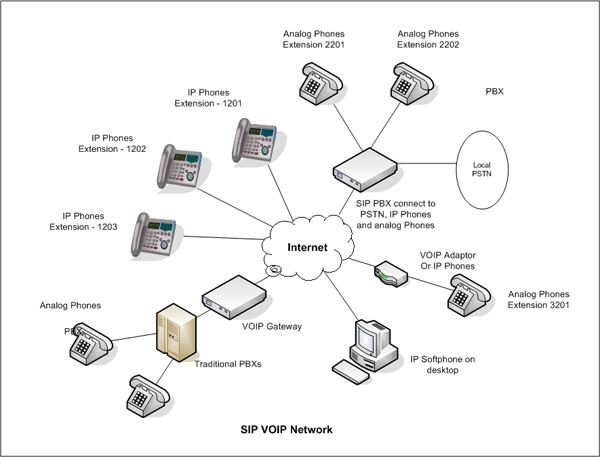Entreprise VOIP Solution
Why VOIP ?
- Cost savings from IDD Calls, especially in countries where Telecom is not deregulated
- Leveraging local call rates in Singapore eg routing all IDD calls out of China through Singapore
- Very Good Quality due to vast improvement in Internet Bandwidth especially in Asia
- Latency of less than 250msecs for very good quality calls
- Improved performance of VOIP Equipment
- Ease of use with seamless calling through PABX
- Low bandwidth requirement per channel of call 15kbps (ave.)
- Very quick Return on Investment – 3 to 6 months
Typical VOIP Deployment
There are various types of typical VOIP deployment :
a. Multi-point VOIP gateway deployment
An entreprise with mutliple sites having its own PBX may connect to each other using VOIP gateways with FXS and FXO ports. These analog connections allow for existing extensions call seamlessly between offices. The IP connection between offices may be a private network or public internet (either with dedicated internet of broadband network). By leveraging on the IP network, organisations will bypass the PSTN network and completely save on the expensive long distance calls.
b. Session Initiation Protocol VOIP Deployment with gateways, IP PBX and SIP end devices such as IP phones and softphones.
An extension to the simple and traditional Multi-point VOIP gateway deployment, an organisation may add in a SIP proxy to extend the VOIP communication beyond the office PBX to SIP end devices like IP phones and softphones. This is extremely useful for small offices with 1 or 2 staff which does not have a traditional PBX. These users may connect an IP phone over an IP network in any geogrphical region and immediately have an extension line connection from their main office PBX. The user may also be a road warrior on a laptop utilising the hotel broadband to make and receive calls. In small offices with more staff, an IP PBX may be deployed which would allow for local calls to be made and also inter-office calls to be made.

What determines the voice quality of VOIP?
There are 3 main factors that directly affect the voice quality of VOIP through any IP network.
a. Codec used
This refers to the compression and decompression algorithm used to transmit the voice packets. There are 3 main codecs used (but there are others not mentioned here).
i. ITU G723 - compresses the 64kbps call to a 5.6kbps or 6.3kbps voice call. However with IP headers included, the typical bandwidth consumption is about 12kbps
ii. ITU G.729 -compresses the 64kbps call to a 8kbps voice call. However with IP headers included, the typical bandwidth consumption is about 15kbps to 20kbps. This is the preferred codec used by many service providers because of the optimum voice quality and low bandwidth usage.
iii. ITU G711 - the 64kbps digitised voice is not compressed. However with IP headers included, the typical bandwidth consumption is about 80kbps to 100kbps. This is a high bandwith codec and typically used in a LAN environment.
b. IP Network latency - This refers to the round trip time delay for ip packets to return when sent from a source to a destination. The higher the latency, the longer the time delay and the longer the voice packets required to be received. This translates to a pause effect on the hearing party when the speaking party talks.
c. IP Network Jitter - This refers to the variation in the time between IP packets arriving, caused by network congestion, timing drift or route changes. This is perhaps the most important element to achieve good voice quality. A network may have high network latency of up to 300ms or 400ms, however, if the jitter is mainted at very low levels, the voice quality can be very good. Looking back in the past where voice is being carried over satellite, the latency may be very high but the voice quality is still very good because of the low jitter.
Challenges of VOIP deployment
Good planning for VOIP deployment is required in order to ensure a smooth deployment. Some of the key challenges faced during deployment includes :
a. interconnecting with PBX. PBXs and IT systems have traditionally been managed and adminstered by different staff in an organisation. Deploying VOIP solutions require in-depth knowledge of IP network systems as well as PBX systems. Analog trunk and extension connections require tuning in some instances. In some cases, PBXs also have blocking configurations which would prevent the smooth implementaiton of VOIP.
b. Firewall. Whilst the firewall protects the organisation against unwanted IP traffic, it also hinders VOIP to be successfully deployed.
c. Poor network performance. This is big hurdle for VOIP deployment. With poor network, voice quality will be bad and it would be
Vanguard Network's Competence in VOIP Deployment
Good planning and experience in VOIP deployment is required in order to ensure a smooth deployment. We have been a pioneer in VOIP deployment since 2003 and our experience would help ensure a smooth deployment. Our customers choose us because :
a. We vver more than 200 installations experience, both local and internationally
b. Experience with integration on the following:
i PBX : Nortel, Avaya, Ericsson, Alcatel, Siemens, Panasonic, NEC, Toshiba, Nitsuko, Philips, Harris
ii.Firewall : Cisco, Checkpoint, Watchguard, Netscreen, Fortigate, ADSL Routers
c.Co-ordinate directly with PBX vendors to ensure smooth implementation
d. Network of regional partners to provide local support and installation if necessary.
e. Provide Network Performance Diagnostics before implementation. Where possible, re-routing by the ISP can help to improve on voice quality significantly.
f. Checklist before implementation. We have a comprehensive checklist for PBX vendors to ensure all the necessary elements in the PBX are avaialble and programmed accurately before implementation.
g. Many Satisfied Customers !
 ___________________________________
___________________________________